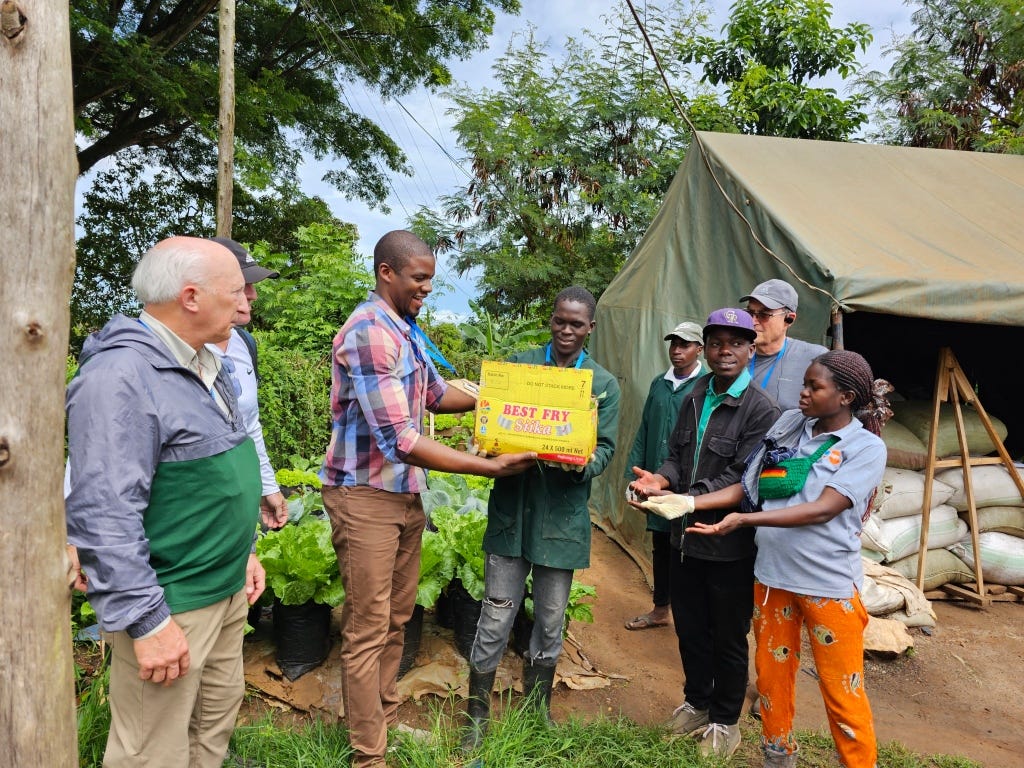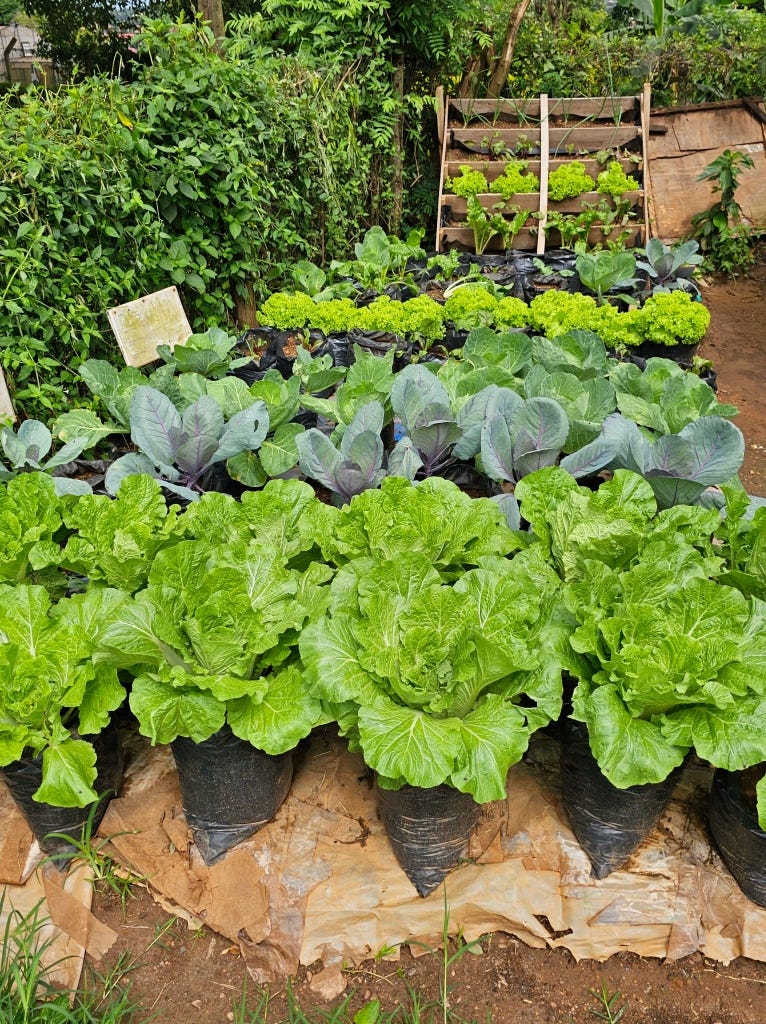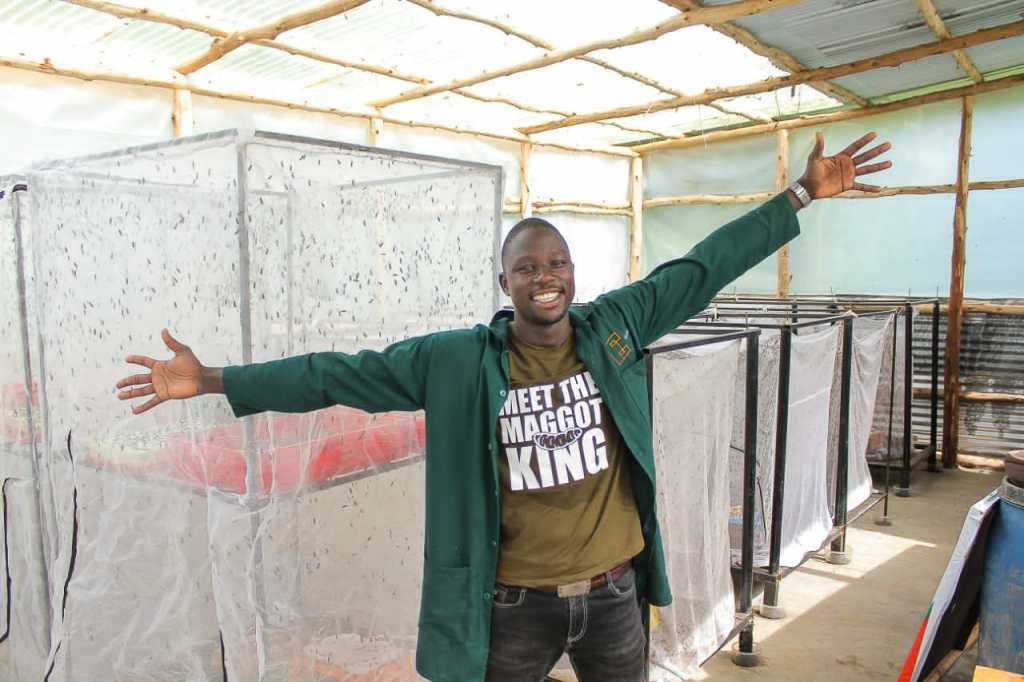Uganda’s population, about 48 million these days, generates a lot of trash. “As a country,” read a recent editorial in the Uganda edition of The Monitor, “we continue to grapple with the problem of solid waste disposal. The volume of waste is naturally increasing in direct proportion with the growth in urban centres.” The editorial finished calling for “clever, cost-effective and clean solutions” to Uganda’s trash problem.
Martin Tenywa, Uganda’s self-proclaimed Maggot King, and his students think they’re onto one. Their solution is like one being adopted by many others around the world: insect farming that turns organic trash into cash.
Martin and his students at Ento Organic Farm, Uganda LTD in Kabanyore, Uganda, collect rotting trash to nourish black soldier flies and their progeny – larvae and pupae. Female black soldier flies lay eggs which turn into larval decomposers, or maggots as they’re more commonly called. Maggot poop, called frass, a combination of undigested material and excrement, can be sold for fertilizer. And then maggots turn into inactive pupae that are dried, crushed, and that can be sold for animal feed or are left as pupae to hatch out.
To understand the enormity of the trash problem (and the potential for readily available raw materials) in Uganda, imagine taking California’s population of roughly 40 million people, adding another 8+ million, and shoehorning them into an area a little smaller than Oregon, plopping down 27% of them in urban areas. That’s the number of people producing trash, also referred to as waste, in Uganda today.
In the capital city of Kampala more than 1,500 tons of waste are generated every day “and it’s estimated that in urban areas waste generation stands at about 1 kilogram a day” (see article and photos at Kansanga, Kabalagala and Bugolobi slums choking on garbage). In 2016, an estimated that 7 million tons of waste were generated by the country’s municipal areas (which are growing by close to 5.5% a year) with only 5% recycled annually. In the lowest income areas, just 1/3 of that waste ends up in landfills. Uganda’s urban areas alone are projected to grow from 2021’s 11.4 million to 21 million by 2040 and 103 million by 2050. Figuring out what to do with all that trash is a big problem getting bigger (and smellier) every day.
There’s serious money to be made off black soldier flies in Uganda and around the world. A 2022 report on Yahoo Finance said that globally, black soldier flies and their byproducts will generate $3.96 billion dollars this year. With median incomes of $814 a year, why shouldn’t Ugandans get a piece of that? Why shouldn’t Martin and his students?

Ento Organic Farm students, most from the poor, marginalized areas of Kampala, are latching on to Martin’s vision to create sustainable and profitable businesses that contribute to a cleaner environment, reduce feed and fertilizer costs for farmers, and leave smaller carbon footprints. And in addition to removing organic trash from the waste stream and producing high quality, lower cost inputs for farmers, at least one study in Japan reported a slight reduction in putrid odors from rotting organic waste. But not surprisingly, the smell doesn’t bother Martin and his students one bit.
Martin, CEO and Founder of Ento Organic Farm, gives his students the knowledge, planning strategies, skills, and confidence to start their own black soldier fly businesses (or work for others). Roots-Africa, the nonprofit organization with which I went to Uganda, is helping equip and coach Martin’s students to succeed.
The business model follows the life cycle of the black soldier fly: they live as adult flies for up to 15 days, lay eggs (which hatch after 4 days), 21-45 days as larvae, and about 3 weeks as pupae. The flies mate in a netted enclosure called The Love Tent. The day we visited, volunteers clung to the outside of the Love Tent, desperate to get in.

Black soldier flies are found on every continent but Antarctica and prefer warm, humid environments like equatorial Uganda. Adults are about 5/8” long and are black with iridescent wings, resembling wasps without stingers. They aren’t typically attracted to humans like a housefly. After mating, females lay eggs (between 600 and 800 at a time) that hatch into ravenous, organic waste-consuming maggots. They’re fed waste gathered from nearby communities, and eat non-stop, increasing their body mass and producing copious amounts of frass to be used by farmers as rich organic fertilizer for vegetables, coffee, fruit trees, and other crops. After their protracted feeding frenzy, the satiated maggots transform into dormant pupae. About 80% of them are dried and packaged for high protein animal feed for poultry, pig, and fish, while 20% are kept and hatched out for breeding stock, becoming new adult black soldier flies. And the cycle begins anew.
Most of Martin’s students didn’t graduate from elementary school, but he introduces them to opportunity anyway. He recruits disadvantaged youth, lifts them, and implants the idea that they can rise above their circumstances to start their own businesses if they work hard, and don’t mind working with trash, insects, and frass. Not all of them will, but some do. Martin calls these changemakers.

The model is sustainable, but it’s not easy. A black soldier fly business should start, Martin says, by getting good breeding stock: he advises his changemakers to buy from reputable breeders. He cautions them in an online YouTube video that if they start their own businesses, they will eventually also need capital, land, a building and other infrastructure, power (electricity), water, access to high quality black soldier fly parent stock, market access, organic waste and a truck to transport it, favorable climate and light conditions, and importantly, good relations with neighbors because trash stinks.
His students are initially concerned about how to make it all work. He advises them to start raising black soldier flies while they’re still planning for their businesses.
“I tell my changemakers, don’t worry about resources now. They will come. Use this time to plan,” Martin said. “While they’re developing a business plan, the flies breed, lay eggs, poop, and hatch into larvae very quickly. Then the larvae go on consuming and pooping, followed by the pupae stage.” It’s a fast process.

Martin is motivated to lift his students up because he was similarly elevated. Raised by a single mother, he studied at Bukalasa Agricultural College, an incubator for kids who need and deserve a chance. Ento Organic Farm also gives them that chance. The rest is up to them.
Obviously, Martin and his changemakers’ efforts amount to a drop in the huge bucket that is Uganda’s overwhelming trash problem, but eventually, Martin thinks, they’ll amount to much more. Resources will come.
They’re raising black soldier flies while they’re planning, and I wouldn’t count them out. Because all that trash just smells like money to the Maggot King and his changemakers.






This is incredible! I love this technology
This is such a great piece. Thank you for sharing it with the world.